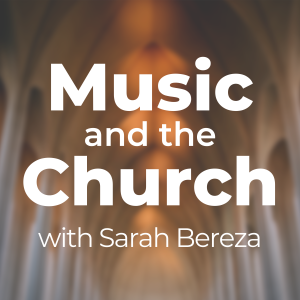
How to Get Youth Invested in Music Ministry, with Anny Stevens-Gleason, on Music and the Church Ep. 28
 2018-10-03
2018-10-03
Download
Right click and do "save link as"
Want to get kids to church VERY early on Sunday mornings? Here's how one music leader uses bands to get youth invested in music ministry.
Anny Stevens-Gleason knows something about getting kids to church. She’s the Minister for Liturgy and Incorporation at the Episcopal Church of the Redeemer (Cincinnati, Ohio). She directs three bands that cover the contemporary service at the church—one for 5th through 8th graders, one for high schoolers, and one for adults.
For the musicians, that means rehearsing on Saturday afternoons, showing up early on Sunday mornings, practicing the music at home, and maybe studying it in a private lesson.
When I was the interim organist at the the church, I saw firsthand how well this program worked. These young people made high-quality music, and their investment in the band was long-term.
Helping Youth People Engage More Fully with Their Faith
For me, the big goal in learning about Anny’s ministry is that I want to help young people engage more fully in their faith.
What I like about the band model is that bands intrinsically have room for a wider range of musical skills than choirs do. For one, you don’t have to sing in order to participate. If you do sing, you might have the skill to sing lead, or you might have the skill to sing melody on the refrain with a chorus of other people. And all of those roles are important in the band, and they all engage the musicians.
Is This Just About Pop Music?
No, this episode is primarily about the band model—the way the musicians form an ensemble. We’re not really talking about a particular music style.
Second, if you’re thinking, “I don’t do that top 40 hits stuff,” know that Anny starts with the hymnal. In fact, she encourages us to start with the songs the congregation and musicians already know.
Finally, Anny’s background is in classical voice, so we’re talking about how classical trained musicians can do this—and why.
Enjoying this podcast episode? Click here to find other Music and the Church episodes, or subscribe to the show wherever you listen to podcasts.
Key Takeaways from the Conversation
Give musicians a safe place to learn and grow, and you give them confidence that leads to excellence.It’s important to discuss song lyrics, especially when connecting secular lyrics to a sacred context.If you are starting a band, choose songs the musicians and congregation already know. Think of it as familiar songs with a different accompaniment.When introducing a new song, it’s okay (even good!) to repeat it for several weeks. In Anny’s case, it is easy to keep the same song feeling fresh because the accompaniment changes every week as different bands lead.The learning curve for a mixing board can be steep. If you are thinking of starting a band, take this necessary education into account. Is there a volunteer in the church who can take lead on this? If you are the person who needs to manage the sound board, how much time can you allot to continuing education?
Resources We Mentioned
Anny's SoundcloudAnny's Spotify PlaylistSpikenard, the high school band Anny leadsShruti boxMusic That Makes CommunityYou Call That Church Music?Singing from the Lectionary"The Scientist" by Coldplay"Shine" by Collective Soul
Share This Podcast
If you enjoy this podcast, please share it with your friends who love church music. It's the best way for them to find the show!
view more
More Episodes
012345678910111213141516171819
Create your
podcast in
minutes
- Full-featured podcast site
- Unlimited storage and bandwidth
- Comprehensive podcast stats
- Distribute to Apple Podcasts, Spotify, and more
- Make money with your podcast
It is Free
- Privacy Policy
- Cookie Policy
- Terms of Use
- Consent Preferences
- Copyright © 2015-2024 Podbean.com





